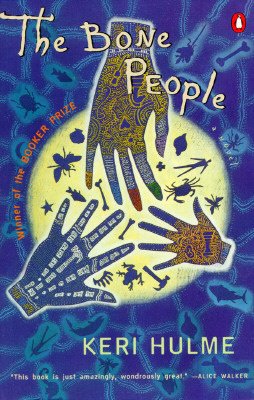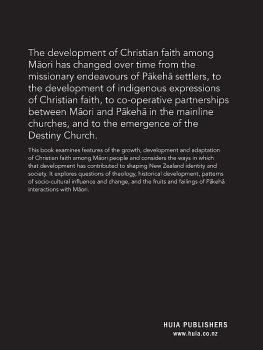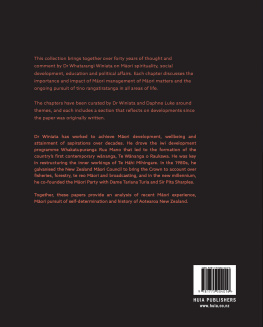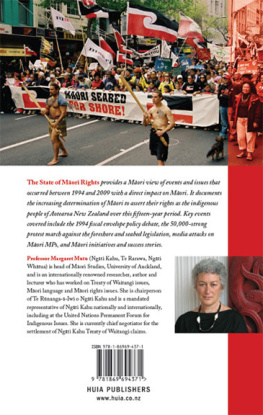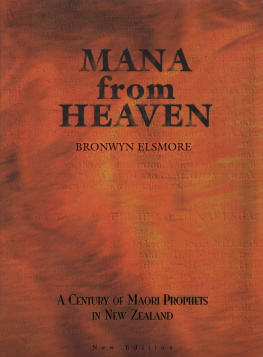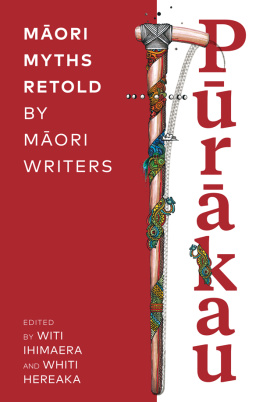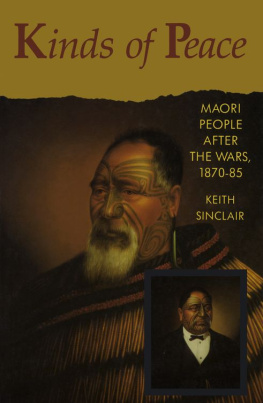Keri Hulme
The Bone People
Keri Hulme. Preface to the First Edition
Standards in a non-standard Book
The Bone People began life as a short story called "Simon Peter's Shell". I typed it out on my first typewriter, nights after working in the Motueka tobacco fields. The typewriter was a present for my 18th birthday from my mother, but that's another story.
"Simon Peter's Shell" began to warp into a novel. The characters wouldn't go away. They took 12 years to reach this shape. To me, it's a finished shape, so finished that I don't want to have anything to do with any alteration of it. Which is why I was going to embalm the whole thing in a block of perspex when the first three publishers turned it down on the grounds, among others, that it was too large, too unwieldy, too different when compared with the normal shape of novel.
Enter, to sound of trumpets and cowrieshell rattles, the Spiral Collective.
The exigencies of collective publishing demand that individuals work in an individual way. Communication with me was difficult
I live five hundred miles away, don't have a telephone, and receive only intermittent mail delivery so consensus on small points of punctuation never was reached. I like the diversity.
The editor should have ensured a uniformity? Well, I was lucky with my editors, who respected how I feel about oddities. For instance, I think the shape of words brings a response from the reader
a tiny, subconscious, unacknowledged but definite response. "OK" studs a sentence. "Okay" is a more mellow flowing word when read silently. "Bluegreen" is a meld, conveying a colour neither blue nor green but both: "blue-green" is a two-colour mix. Maybe the editors were too gentle with my experiments and eccentricities. Great! The voice of the writer won through.
To those used to one standard, this book may offer a taste passing strange, like the original mouthful of kina roe. Persist. Kina can Become a favourite food.
An explanatory dream: I am in an open windowed railway carriage, going slowly round some mountains. I say to an unknown friend, "Hey! These must be the Rimatakas," and sure enough, across the pasty mountains rolls the inscription RIMUTAKAS 10,000 FEET HIGH, liquorice black on almond icing, and the carriage turns into a Club Room. The lady in charge has a smile hedged with teeth.
"O yes, you can become a member. It'll cost $10." I offer a plastic card very bloody conscious I don't have a dollar, let alone ten. I say, guiltily, whakama, "This jersey I'm wearing, the moth holes only came up now. It was really white before." She smiles, and goes away into the dark. It really surprises me when she returns with a jug of beer and another smile for me and my friend. We all sit there, dozens of us, train rocking sadly, mountains cold, moth-holes, but not a squash court in sight.
Make of it what you will.
Kia ora koutou katoa.
Keri Hulme, 1984
Prologue. The End At The Beginning
He walks down the street. The asphalt reels by him.
It is all silence.
The silence is music.
He is the singer.
The people passing smile and shake their heads.
He holds a hand out to them.
They open their hands like flowers, shyly.
He smiles with them.
The light is blinding: he loves the light.
They are the light.
He walks down the street. The asphalt is hot and soft with sun.
The people passing smile, and call out greetings.
He smiles and calls back.
His mind is full of change and curve and hope, and he knows it is being lightly tapped. He laughs.
Maybe there is the dance, as she says. Creation and change, destruction and change.
New marae from the old marae, a beginning from the end.
His mind weaves it into a spiral fretted with stars.
He holds out his hand, and it is gently taken.
She walks down the street. The asphalt sinks beneath her muscled feet.
She whistles softly as she walks. Sometimes she smiles.
The people passing smile too, but duck their heads in a deferential way as though her smile is too sharp.
She grins more at their lowered heads. She can dig out each thought, each reaction, out from the grey brains, out through the bones. She knows how. She knows a lot.
She is eager to know more.
But for now there is the sun at her back, and home here, and the free wind all round.
And them, shuffling ahead in the strange-paced dance. She
quickens her steps until she has reached them. And she sings as she takes their hands.
They were nothing more than people, by themselves. Even paired, any pairing, they would have been nothing more than people by themselves. But all together, they have become the heart and muscles and mind of something perilous and new, something strange and growing and great.
Together, all together, they are the instruments of change.
IN THE BEGINNING, it was darkness, and more fear, and a howling wind across the sea.
"Why not leave him?"
They can't whisper any more.
"No guarantee he'll stay on the bottom. Besides, we'll have to come back for the boat."
The voice. The nightmare voice. The vivid haunting terrible voice, that seemed to murmur endearments all the while the hands skilfully and cruelly hurt him.
"We'll have to move soon."
It is happening again, and like the time before, there is nothing he can do to stop it. It will take away the new people, it will break him, it will start all over again. He cannot change it. And worst of all, he knows in an inchoate way that the greatest terror is yet to come.
There is a sudden pause in the crashing of the waves, and a drawn prescient hissing.
"Jump now! Take the jacket, I'll swim. I can take care of him."
Even now, the barb of laughter in his voice.
Take care? Aiie!
In the memory in the black at the back of his eyes, there are words, different words. Help, but not help. Words. There were words.
But then the overwhelming wrenching groan of the boat as she struck the rocks.
IN THE BEGINNING, it was a tension, an element of strain that
grew and crept like a thin worm through the harmony of their
embrace.
"What is it you want?"
"Ahh nothing you're all the man I need." Chuckles in the warm dark.
Sitting up then and saying to him urgently:
"You must have a son. You must have people."
It gnaws at him. She knew, somehow, that she wasn't going to
be the person who gave him a son, who gave him people. And she
never told him.
Then, he had only chuckled again and said, "Well, we got him
on the way, ne?"
But the undefinable careworm was still there.
After the storm-night, they talked about the tide-washed child.
"I think he likes us," he had said.
"He needs you look at him hold on though he's not himself
yet."
"Shall we keep him then?" half-joking.
She had answered "Yes!" without hesitation.
"Before our baby? Before our son?"
"Before them all, man," and she had turned out of his arms and
danced, in lumbering triumphant glee.
Then the worm of care had gone. They were whole and sound
together until the night they took her away.
It gnaws at him: the last words she gave him as they wheeled
her under the flaring lights. Harsh and whispered, "O Ngakau, mind
our child."
Timote was already dead.
She meant the other one, the one who sat on his lap unmoved
it seemed, while he was shook and robbed of breath by sobbing.
"Hana is dead, dead, dead" the pale child held his hand, and
looked into his face with alien sea-coloured eyes, unclouded by tears.
Marama said how bitterly, how hysterically upset he had been. But
he never showed it to me.

